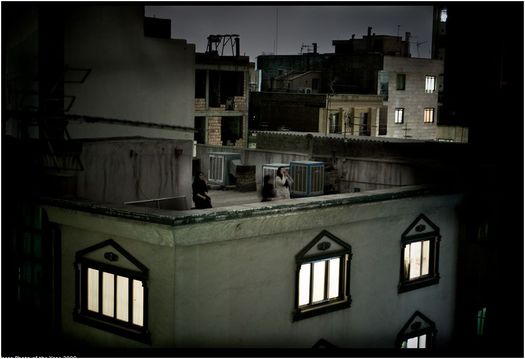In the months following the stolen Iranian election, after hearing how citizens were literally shouting protests from the rooftops, I kept scanning the news wires for a visual example of this resistance to the regime. I finally gave up looking.
Like Obama's Nobel, the choice of this photo as World Press Award Top Prize seems aimed at inspiration. As the world sits and watches from on the sidelines, this photo, in its distance from its subjects and emptiness, captures both the grace and remote prospects of the Iranian opposition.
(The comments below are adapted from a post about this photo which originally ran here on June 28, 2008.)
"War all comes down to these little tiny stories about people's lives that will never be the same."-- Eugene Richards
Looking back, the depiction of trauma and loss suffered by Iraq veterans, as documented by so many fine photographers, surely played a critical role in galvanizing the American public against an otherwise fundamentally sanitized war.
At BAGnewsNotes, I looked at many of the most difficult images, including Todd Heisler's essay, "Final Salute"; Nina Berman's "Marine Wedding" photograph of Ty Ziegel and Renee Kline -- since divorced; Andrew Lichtenstein's photo of a funeral rehearsal in Modesto; and the haunting image by Barry Gutierrez of Sgt. Ryan John Baum with his daughter, Leia, on his chest.
The photo above was taken by Eugene Richards as part of a series he is developing with The Nation Institute. Sgt. José Pequeño who suffered a devastating brain injury from a grenade tossed into his Humvee in March 2006, is in his mother's arms.
There are few more visceral reminders of the senselessness of the Iraq campaign. Given the angle, Pequeno's brain injury draws an unavoidable analogy between war and the capacity for thought. Ultimately, there is no rationalizing or comparing one devastating form of injury with another. In Sgt. Pequeno's case, however, the war literally caused him to lose his mind.
(photo 1: Pietro Masturzo. caption: Women in Tehran shout from a rooftop in protest against the regime on 24 June in Tehran. The Iranian presidential elections were held on 12 June and the results, proclaiming victory by President Mahmoud Ahmadinejad over opposition candidate Mir-Hossein Mousavi, were strongly contested. In the weeks following the election, violent protests took place in the streets. At night, when the streets were empty, people went on to the rooftops of their homes to continue shouting their dissent. Their cries of 'death to the dictator' and 'Allah u Akbar' -- Allah is great -- echoed through Tehran.)
